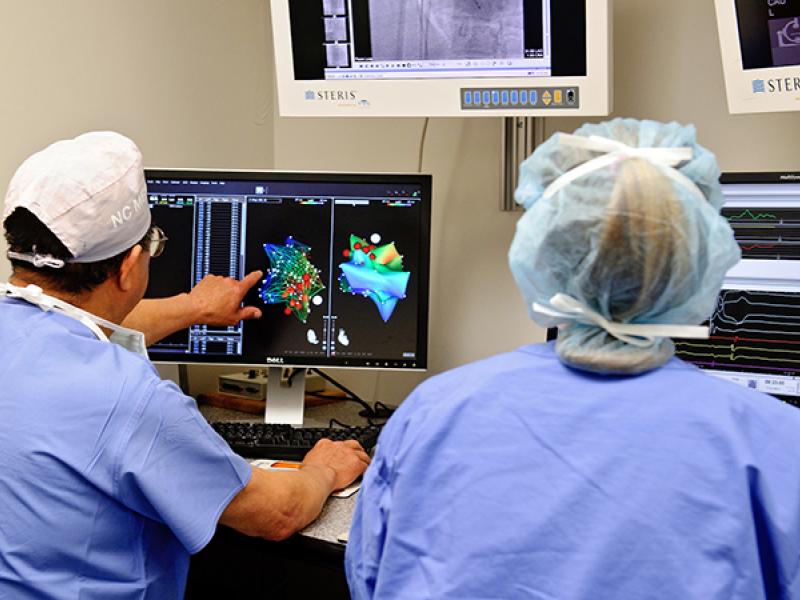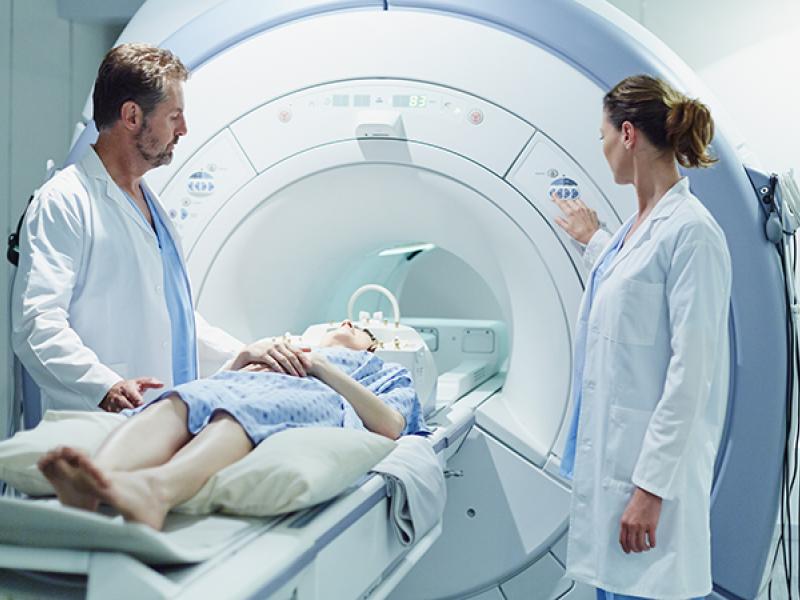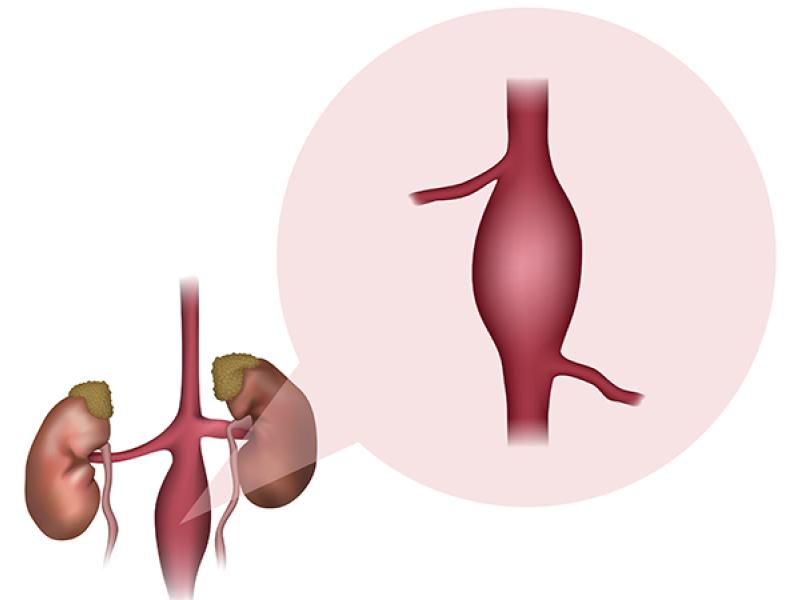The goal of the ambulatory care rotation is to provide fellows with training in both consultative and longitudinal care for the full spectrum of patients with cardiovascular disease and associated conditions. Fellows will attend weekly clinics, maintain continuity by participating in patient’s care during hospitalizations and communicating test results directly, and interact with family members as well as referring and collaborating physician and health care professionals. Fellows will also interact professionally with patients, families, and all members of the ambulatory cardiovascular team.
In the ambulatory care setting, fellows will develop an appreciation of the pathophysiologic mechanisms of disease, of the use of diagnostic testing, and of the response of therapy over longitudinal follow-up of patients with cardiovascular disorders over the course of the 3-year training program with faculty supervision. The Cardiovascular Medicine (Cardiology) Clinics at MUHC and VA provide the opportunity for a single continuity clinic for the entirety of the fellowship at each facility.
The clinic scheduling template is designed to meet the ACGME goal of four to eight patients during each half day session.” The projected volume per fellow (based on 48 weeks of clinic, MUHC/VA combined) is 192 minimum to 384 maximum number of patients seen annually. Fellows are encouraged to follow patients they have initially evaluated on the inpatient services.
Rotation leaders
- Dr. Mary L. Dohrmann (MUHC)
- Dr. Poorna Karuparthi (VA)
The outpatient clinical experience will also help the fellows gain an understanding and skills in the following:
- Office organization including the function of receptionist, scheduling, nursing support, record keeping, dictation, billing procedures and other business aspects of the office.
- Knowledge of the services available and how to access them such as obtaining consults from other services, laboratory, radiology, rehabilitation, social services, etc.
- Understand the patient’s ability to receive medical care as to travel, financial constraints, family support, and other personal issues affecting receiving appropriate care.
- Improve communication skills with the patient and their family in understanding their illness and the rational the recommended care carefully explaining any side effects or complications that might occur and the seriousness of the complication as to risk-benefit.
- Improve skills in time management.
- Prompt documentation of medical data and communicating this to appropriate people.
- Develop a thorough understanding of the ICD-10 code and its importance to the patient and third-party carriers.
- Understand the Resource-Based Relative Value Scale as it applies to services rendered.
- Understand reimbursement policies by private insurance carriers, Medicare, Medicaid and other financial sources.
- Skills in appropriate follow-up care coordinated with the care given by the referring physician and patient’s ability to receive care. Develop skills communicating with referring physicians.
Objectives (level-based)
1st year fellow
- Recognize the differential diagnosis of chest pain and determine appropriate diagnostic work up.
- Recognize the differential diagnosis of dyspnea and determine appropriate diagnostic work up.
- Review indications for cardiac testing, including stress testing, echocardiography (transthoracic and transesophageal), coronary angiography, CT, and MRI.
- Perform complete history and physical exam, refining aspects of the cardiovascular exam.
- Formulate assessment and plan with attending supervision.
- Review differential diagnosis for palpitations, lightheadedness, and syncope, as well as appropriate diagnostic work up.
- Integrate information from diagnostic testing to optimize patient care.
- Identify high-risk features that require close follow up and/or inpatient admission.
- Understand the role of preoperative risk stratification and indications for cardiac testing.
- Effectively communicate findings by completing clinic note in a timely manner and communicating with the referring physician or health care professional when indicated.
- Effectively communicate with patients and their families about patient’s condition, plan of care, and prognosis, initially with assistance from the supervising attending.
- Review evidence and guidelines pertaining to ambulatory cardiovascular care, including hypertension, lipid management, primary prevention, and diabetes management.
- Understand the role of lifestyle changes in management of cardiovascular disease.
- Recognize the role of stress, anxiety, depression, and other mental health comorbidities in cardiovascular disease.
- Interpret electrocardiograms accurately.
2nd-3rd year fellow
In addition to the above:
- Formulate a differential diagnosis as well as detailed assessment and plan independently.
- Manage patients with a wide variety of cardiovascular conditions including but not limited to hypertension, hyperlipidemia, stable ischemic heart disease, congestive heart failure, arrhythmias, valvular heart disease, pericardial disease, and peripheral vascular disease.
- Apply clinical guidelines and evidence-based medicine consistently.
- Determine appropriate medication regimen and recognize side effects as well as non-adherence.
- Review indications for cardiac rehabilitation and collaborate with facilities to optimize patient care.
- Provide guidance to patients on physical activity appropriate to their condition.
- Independently conduct discussions with patients and families regarding patient’s condition, plan of care, and prognosis, and recognize indications for palliative care.
Clinic description
- MU Fellow Clinics are Monday or Wednesday afternoons from 1 p.m. to 5 p.m. in the MU Heart and Vascular Center on the first floor of University Hospital. Monday and Wednesday MU clinics alternate with Tuesday and Thursday VA Outpatient Cardiology Clinic. VA Cardiology Clinic is located on the first floor of the VA and runs from 1 p.m. to 4 p.m.
- An annual master clinic schedule is distributed each July.
- Clinics are cancelled on the master clinic schedule when a fellow has either CICU or night-float responsibilities.
- Clinics may be cancelled when a minimum of 30-day advance notice is submitted to request an absence (i.e., vacation or other authorized absence) with the fellowship program coordinator.
- If a 30-day notice is not provided, the fellow must arrange for another fellow to see the scheduled patients. No clinics will be cancelled without 30-day notice.
- At MUHC, if the fellow needs to make a “Special” appointment for a patient on a non-assigned day, appointments may be arranged on a per patient basis by arrangement with the clinic staff. Such appointments are usually made for tenuous patients needing earlier than two-week follow-up. The fellow must pre-arrange an attending for these special appointments.
Cardiology Fellow responsibilities for the MUHC and VA Outpatient Services include:
- Make every effort to be on time for scheduled appointments. In case of an emergency, notify the clinic attending of an absence and your substitute for the clinic.
- Provide a written evaluation, including a diagnostic plan and treatment strategy.
- Discuss the plan with the assigned cardiology attending.
- Review all diagnostic studies including ECGs, chest X-rays, stress tests, echocardiograms, ambulatory monitors and cardiac catheterization studies.
- Clinic notes should be signed within 48 hours and forwarded to the supervising attending for review and to the referring provider.
- Respond to all messages from clinic nurses and support personnel in a timely manner, including requests for refill of medication, clarification of orders, and for fulfilling patient requests.
Attending responsibilities
The attending cardiologist will supervise the fellow for every patient in clinic and oversee the plan of care. The attending will review documentation and make additions if needed.
Evaluation of trainee
The fellow will be given a six-month evaluation by the program director to include number of patients seen, patient no show rate, comments from patients, and feedback from clinic personnel and faculty.





